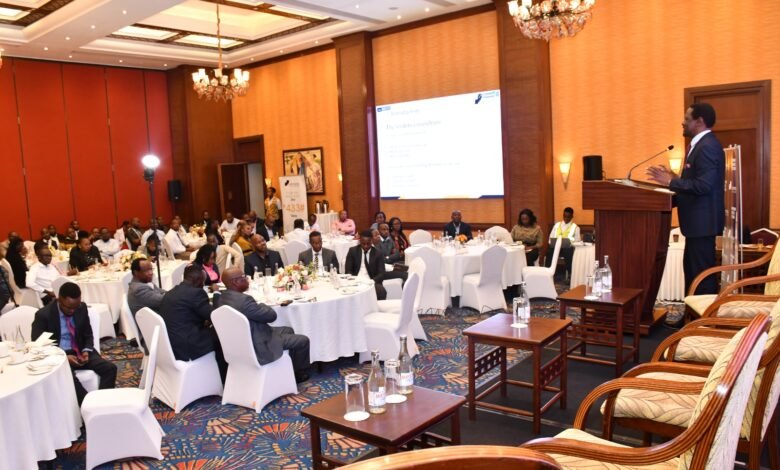
The financial sector is witnessing a significant shift in how banks and microfinance banks (MFBs) assess credit risk, driven by evolving regulatory frameworks and economic conditions.
This was the key focus of a breakfast meeting hosted by Metropol in Nairobi, where industry experts and financial leaders gathered to discuss the effectiveness of Expected Credit Loss (ECL) models in relation to interest rate determination.
For a while, banks have relied on judgmental adjustments to modelled ECL outputs to reflect current macroeconomic conditions, especially where historical data used in model development fails to capture evolving risks.
ECL is primarily implemented under the International Financial Reporting Standards (IFRS) 9, which provides a forward-looking approach to estimating potential future losses on loans or credit exposures.
According to PwC, this method takes into account borrower creditworthiness, economic conditions, and future forecasts, making it a more effective tool compared to traditional “incurred loss” models.
During his presentation at the event, Dr. Samuel Tiriongo, Director of Research and Policy at the Kenya Bankers Association (KBA), emphasized the ongoing transformation of the credit market through the adoption of risk-based pricing (RBP).
He said milestones have been achieved in the regulatory framework, which have enabled financial institutions to move away from collateral-based credit decisions toward a more risk-sensitive approach.
Dr. Tiriongo pinned out key elements of risk-based credit pricing, including:
- Credit Risk Assessment: Evaluating borrower creditworthiness through credit scores and prevailing economic conditions.
- Fair and Competitive Pricing: Aligning loan costs with risk levels to prevent overpricing or underpricing.
- Transparency & Disclosure: Providing customers with clear loan terms, pricing structures, and risk explanations.
- Regulatory Compliance: Ensuring alignment with banking sector regulations and ethical lending practices.
To further strengthen credit risk assessment, Dr. Tiriongo proposed key recommendations:
Also Read: What it Means as Kenyan Banks Adopt Risk Based Pricing Model
- Credit Risk Database: Establishing a centralized risk data system for improved ex-ante risk modeling of enterprises.
- Alternative Data Exploration: Incorporating mobile payments, utility bills, and behavioral data for better credit profiling.
- AI in Risk-Based Pricing: Leveraging artificial intelligence to enhance risk predictability in lending.
- Policy Dialogues: Addressing factors that contribute to high credit costs beyond lenders’ control.
The Role of IFRS 9 in Financial Asset Classification
Metropol Group Managing Director, Sam Omukoko, delved into the specifics of IFRS 9, which dictates how financial assets and liabilities should be classified and measured.
He explained that assets without significant deterioration are recognized with a 12-month expected credit loss, whereas assets that have undergone substantial deterioration are recognized with lifetime expected credit losses.
Omukoko said implementing IFRS 9 enables banks to assess credit risk more effectively while ensuring financial stability in the sector.
Access to Finance: The Cost of Credit in the Market
The discussion also shed light on access to finance, a critical issue for businesses and individuals seeking credit.
Elizabeth Nkukuu, Chief Executive of Financial Inclusion, said that while mobile lenders have bridged the financing gap where mainstream lending institutions failed, their rates remain costly for most borrowers, averaging 7% per month.
She worries that this, even though better placed for financial access, a lot needs to be done to create more affordable credit solutions to enhance financial inclusion.
The Metropol Banks and MFBs Breakfast Meeting provided a platform for industry leaders to engage in meaningful discussions on improving credit risk assessment through ECL models and risk-based pricing.
Metropol Credit Reference Bureau Chief Executive Gideon Kipyakwai signed off the forum saying that as financial institutions continue to refine their methodologies, the adoption of alternative data, artificial intelligence, and enhanced policy frameworks will be key to fostering a more efficient and transparent credit market.






Hi there! This post couldn’t be written any better! Reading through this post reminds me of my previous room mate! He always kept talking about this. I will forward this article to him. Pretty sure he will have a good read. Thank you for sharing!
I’ve recently started a blog, the info you provide on this web site has helped me greatly. Thank you for all of your time & work.
I am extremely inspired along with your writing skills as smartly as with the structure on your blog. Is that this a paid topic or did you customize it yourself? Either way keep up the nice high quality writing, it’s rare to see a great blog like this one today!
Hi there, I found your blog via Google while looking for a related topic, your site came up, it looks good. I have bookmarked it in my google bookmarks.
Pretty! This was a really wonderful post. Thank you for your provided information.
You actually make it seem so easy with your presentation but I to find this matter to be really one thing that I believe I would never understand. It sort of feels too complicated and very wide for me. I am taking a look ahead in your subsequent submit, I?¦ll attempt to get the hang of it!
Hello.This post was really fascinating, particularly because I was searching for thoughts on this topic last couple of days.
Utterly composed content, Really enjoyed studying.
Hi there! This post couldn’t be written any better!
Looking through this article reminrs me oof my previous
roommate! He constantly kept preaching about this. I am goig to send
this post to him. Prettry sure he’s going to have a
very good read. I appreciate youu forr sharing!
Hey! Do you know if they make any plugins to protect against hackers? I’m kinda paranoid about losing everything I’ve worked hard on. Any suggestions?
I have been exploring for a bit for any high quality articles or weblog posts in this sort of area . Exploring in Yahoo I finally stumbled upon this web site. Studying this info So i am happy to show that I’ve a very just right uncanny feeling I discovered exactly what I needed. I so much undoubtedly will make certain to do not omit this web site and provides it a look regularly.
Saved as a favorite, I really like your blog!